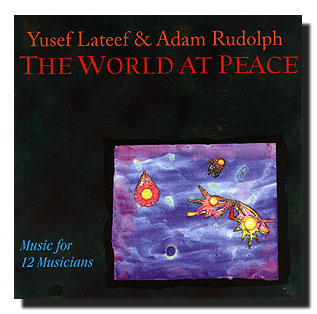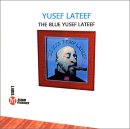

Courtesy of Yusef Lateef

Meta Records
![]()

Label M
![]()
A
FIRESIDE CHAT WITH YUSEF LATEEF
Yusef Lateef is an artist in the purest form of the word. I have long
been a fan of Lateef's playing from his Riverside dates like The Three
Faces of Yusef Lateef, to his Prestige works like Eastern Sounds and Into
Something, on through to his Impulse! sessions like Live at Pep's, to
his Atlantic tenure with albums like Part of the Search, and more recently
with his own YAL label. I had always wondered why more magazines did not
cover Lateef of late. Perhaps, they aren't in the know or perhaps, they
don't know any better. So I bring him to you, unedited and in his own
words.
YUSEF LATEEF: First of all, Fred, in this interview, I request that you
don't refer to me as a jazz musician. My music is jazz.
FRED JUNG: Let's start from the beginning.
YUSEF LATEEF: I started in high school with a teacher there. I also took
lessons at the Conservatory of Music in Detroit. Detroit was very motivating.
There were a lot of local people who inspired me like Kenny Burrell, Paul
Chambers, Roy Brooks, Donald Byrd, etc.
FJ: What was the music of the day?
YUSEF LATEEF: Well, the big bands like Count Basie and Earl Hines and
Tiny Bradshaw. I played in a local big band, Lucky Millinder. I was also
playing with a combo, a quintet. It paid what was the status quo at the
time.
FJ: When did you begin to include the flute into your repertoire?
YUSEF LATEEF: I started to study the flute in 1951. The flute has been
utilized by African-American musicians as far back as the early Twenties.
If you take a look at some of the old pictures of Chick Webb, then you
will see the flute right there on the bandstand among the woodwinds.
FJ: You also presented the oboe and the bassoon, not traditionally considered
in improvised music, in performances.
YUSEF LATEEF: Well, in high school, my teacher tried to get me to play
the oboe and later on, I reflected on that and then I took him up on it.
After I started to record, I didn't want to reinvent the wheel with each
album, so then I studied the bassoon and included it as well as some miscellaneous
instruments like Japanese flute and then I began to make flutes to enhance
the canvas of my expression.
FJ: That kind of dedication and sacrifice to your art seems like something
of another era these days.
YUSEF LATEEF: Well, oboists make their reeds so it is nothing new in a
sense. It is just another part of musical expression.
FJ: When did you move to New York?
YUSEF LATEEF: January 1960.
FJ: Why did you wait so long?
YUSEF LATEEF: Because I was doing well in Detroit. For five years I had
a steady job and I was recording.
FJ: What were your initial impressions of the Big Apple?
YUSEF LATEEF: It was a different scene, a new environment. A lot of people
who I respected were there.
FJ: Give me your thoughts on your time with Charles Mingus.
YUSEF LATEEF: As a player, I think he was excellent. He was a master bassist
and as a composer, he was a composer of large magnitude you will. He inspired
me by his ability and his concepts were so original, they inspired me.
FJ: Why is it you are not acknowledged for the wealth of compositions
you have penned?
YUSEF LATEEF: As you say, I am not given recognition. I don't know why.
Maybe it doesn't affect them. They don't understand the aesthetic of my
music and if that is the case then they don't appreciate it. I have met
a lot of people who do appreciate what I do.
FJ: People should take a listen to Live at Pep's.
YUSEF LATEEF: Yeah, it was with Richard Williams, James Black, Mike Nock,
and Ernie Farrow.
FJ: Impulse! recently reissued the second volume.
YUSEF LATEEF: Yes, they have. I am flattered by them re-releasing it.
FJ: You play a bamboo flute on the recording.
YUSEF LATEEF: One I made, yes. It took a couple of hours, I think.
FJ: You make it sound almost commonplace.
YUSEF LATEEF: (Laughing) Well, I had been making them for a while.
FJ: You did some very important work on the Atlantic label as well. I
am hoping I can generate enough buzz to get the reissue arm of the label,
Rhino, to issue a box set of your material. I know I have Joel Dorn's
support.
YUSEF LATEEF: (Laughing) Yeah, OK. We had fine experiences in putting
albums together.
FJ: What prompted you to form your own label (YAL)?
YUSEF LATEEF: Because, well, no one asked me to record for them, so I
just started my own label after my return from Africa. I did record. I
won a Grammy after I came from Africa. Atlantic extended me a three year
contract and after that, no one made any offers, so I started my own label.
FJ: Why did you journey to Africa?
YUSEF LATEEF: I did research there at the Ahmadu Bello University in Zaria,
Nigeria into the Fulani flute, which is called the sarewa. I did that
and I also taught research methodology to Nigerian cultural offices. I
had a third duty. I interacted with the drama and African musicians formulating
convocational plays and things of that nature. In fact, we were invited
to a festival of nations in Bulgaria and we took a play that was put together
called Queen Amina, based on the real life queen who lived in northern
Nigeria about three hundred years ago. I spent four years in Africa.
FJ: Were you concerned that leaving at the height of your popular appeal
might reflect negatively on your marketable appeal?
YUSEF LATEEF: No, no, I think it was advantageous to be exposed to another
culture, that particular culture. I learned a great deal and it helped
reform my concepts and my values and my approaches to music.
FJ: What are some of those values?
YUSEF LATEEF: Well, the value of thinking, of original expression if you
will, utilizing that which is in the environment, like the bamboo flutes
for example. Bamboo grows and so why shouldn't I make a flute out of it.
I learned things through observation, through mental construction. For
example, a Nigerian balafone is not constructed like the marimba of Eastern
Europe or what we have in America. For example, the lowest note may be
in the middle of the instrument as opposed to the far left, which taught
me that there are other ways to make instruments. For example, in America,
they teach us in music school that to express sorrow, you use minor chords.
But in Nigeria, to express sorrow, they use chordal chords. We put on
Queen Amina and there was a chorus in the background to express the feelings
that we are trying to project to the audience when Queen Amina was assassinated
and I had given them a minor chord to articulate and it evolved from a
minor chord into a chordal chord each rehearsal and so I just let it stay
that way because that was expressing grief to them. I learned about attitudes
in terms of what kinds of sounds can express feelings, which I found to
be quite different than I had found here in America.
FJ: What were some of the challenges you encountered in running your own
label?
YUSEF LATEEF: Finding distributors, that was the most difficult thing.
I have about twenty-two CDs that I have produced. North Country is the
distributor and they can even contact me directly at PO Box 799, YAL Records,
Amherst, MA.
FJ: This year marks your eightieth birthday.
YUSEF LATEEF: Next month, yes.
FJ: There should be a celebration of the work you have done in those years.
It troubles me that there is not. This country has a good deal to learn
about appreciating its artists.
YUSEF LATEEF: Thank you, Fred. Well, I do have one recording with my colleague,
Adam Rudolph. We just finished mastering it. We performed it this past
February at Lincoln Center. It is music for eight musicians and the name
of this CD is Beyond the Sky. We are looking forward to releasing that
in the next few weeks. That is one project. For some time, I also released
a CD a couple of months ago called A Gift and it is based on the approach
to intervallic expression. There are certain groups who play a liner line
that exists on a major third and a minor second. That is a distinct kind
of a melodic sound. Also, I have been involved in what I can entophyte
composition. You will find this in some of my recent releases. As you
know, Fred, an entophyte is something that deals with inside something
else, you find this function in botany. I came across this as a result
of auditing a botany class at the university here. Now, I applied this
concept to the vertical chords. For example, if I had a chord that had
a minor second and an augmented fourth and a major third between the intervals
that exist in the chord, the notes in the chord as they move in the interim
fashion, they would only move in one of those three intervals at different
times. That is what I call entophyte compositions and I have used that
in some of my recent compositions. I think it is a natural kind of evolution.
FJ: Yet another progression in your musical vision.
YUSEF LATEEF: You need to or it becomes boring to do the same thing. It
is like walking without moving forward in the same footsteps.
FJ: It must never get boring being Yusef Lateef.
YUSEF LATEEF: Well, if I keep at it. Life itself is an interesting thing,
Fred. Life included thinking and it is such a pleasure to think of new
ways to do things and to express yourself. That is the beauty that you
feel and that you see through observation of nature for example. So you
try to express some type of beauty through your music. I am sure that
it is a privilege and it is a gift to be alive and try to offer something
to culture. You said it, Fred. I am enjoying it. We don't know how long
we will have this opportunity and so I am enjoying it. It is exciting.
FJ: If there is justice in the world, here's to another eighty years,
sir.
YUSEF LATEEF: Thank you so much. I am honored that you chose to talk to
me.
FJ: It is my honor.
Fred Jung is the Editor-In-Chief and finally has an over-priced cigar chair. Email Him.